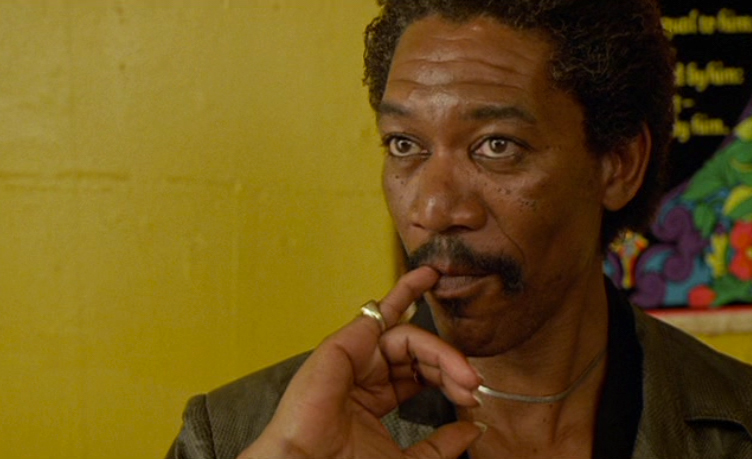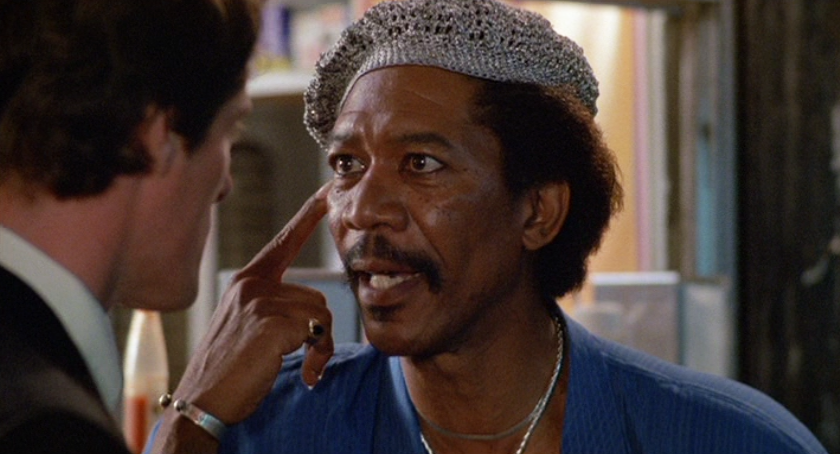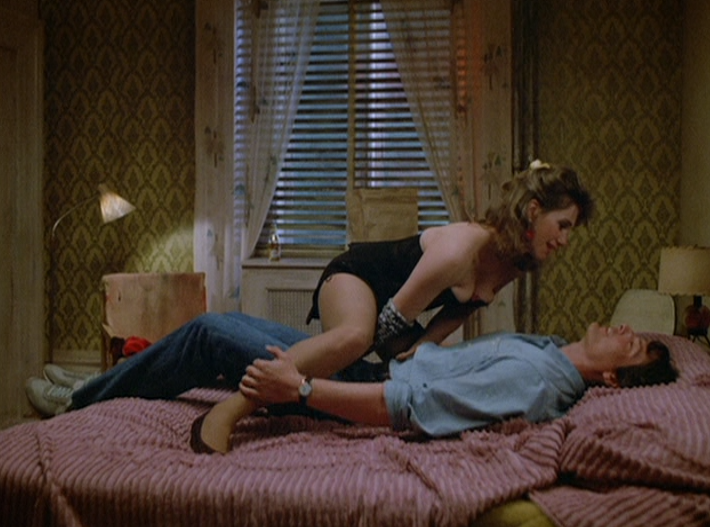Our celebration of Black History Month is, naturally, also an Oscar History Celebration. Today Nathaniel looks at Morgan Freeman's original claim to fame.
When you think of Morgan Freeman what's the first thing that comes up? Given his revered stature in contemporary cinema the answer is undoubtedly pulled from the following character types: wise mentor, savvy professional, trusted friend, quiet confidante, brilliant academic, noble leader. Freeman brings such natural authority and wise but warm old men sass onscreen that playing God in the comedy Bruce Almighty wasn't even a stretch but a light bulb "of course it's Freeman!" moment. So it's a little startling to remember or discover that his first of five Oscar nominations -- he's the most celebrated black actor in Oscar history outside of Denzel Washington -- and indeed his breakthrough in cinema does not fit the Morgan Freeman mold in virtually any way.

This ho said you wanted to meet me so here I am.
No, Morgan Freeman's original claim to big screen fame was as a vicious pimp named "Fast Black" in a largely forgotten journalist-plays-with-fire drama called Street Smart (1987). [More...]
Street Smart is the story of a struggling writer named Jonathan (Christopher Reeve) who pitches a lifestyle story to his magazine about the life of a pimp on the streets. He needs to make a mark as a writer but once he has the assignment he discovers no criminals will speak to him. On deadline he invents the story from whole cloth and it's a raging success. Be careful what you wish for. Soon Jonathan is in way over his head, the only person who knows the truth is his girlfriend (Mimi Rogers, largely underused) and he realize he's got to produce the pimp in question... the one he invented. The plot details are faintly ludicrous (things snowball very quickly and characters make odd plot-helpful decisions), but it's an interesting time capsule and primarily an actor's piece anyway. The film was surely intended as a vehicle for the late Christopher Reeve who was then struggling to prove he was more than Superman. Instead the film made critical darlings and in-demand actors out of the pimp (Morgan Freeman) and his favorite ho (Kathy Baker). For the rest of the 80s and into the early 90s it was illegal to make a movie without featuring one of them.
It's not hard to understand why. While the story is juicy enough to play regardless of implausibility, it's the sparks coming off Freeman and Baker - especially in tandem - that keep Street Smart vivid.

What do you think you're doing? There's money to be made in the street. Get snappin'
In some many ways these are stock characters but Freeman and Baker are both imaginative and skilled and frankly hungry enough actors (at least at this point in their careers) that you can see them burrowing in, absolutely refusing to accept that "Fast Black" and "Punchy" are 'types' at all but crazy vivid individuals instead.
Freeman doesn't play Black's disarming mood swings as swings, so much as switches. Flipping them on and off instantly. It's like that low budget strobe light affect when you flip your lights on and off and on and off only his settings are not on and off but conspiratorial charming and intimate threatening. They are uncomfortably similar settings and their proximity is exploited well in two particular scenes, the first a high society party at which the pimp and ho are guests of (slumming) honor and Black lashes out at Jonathan afterwards about how false he is. The second is a harrowing scene where Black thinks Punchy has betrayed him and she desperately tries to flip his switches herself.


I read people's minds, you dig? You're lying through your teeth. I know it. You know it. And this fucking whore knows it."
The ending feels rather pat and easy for how dark the story gets but some of the finer details of performances linger, like Punchy's inner hopelessness (even when she's flirtatiously planning different futures, you know she knows how it's going to end for her), or Black's need to intimidate even in the moments when he means no real harm. Morgan Freeman won supporting actor at the Spirits, LAFCA, and NSFC and was eventually Oscar & Globe nominated. Kathy Baker wasn't as lucky but was within striking distance; she was nominated at the Spirit Awards (where Freeman won) and named Best Supporting Actress by both the Boston critics and the NSFC but Oscar didn't make room for her in an odd final lineup.
Still, today in 2015, the most interesting takeaway is not so much the performances themselves but Street Smart's odd friction with Freeman's eventual screen persona; a stereotypical pimp seems so beneath him! In one scene that feels tossed off but has aged better than the rest of the movie a black female reporter aggressively challenges Jonathan about his story and claimes he's glamorizing stereotypes and unaware of his subconcious racism and the damage he's causing. You could make the same claim about the movie (a fried-chicken loving pimp, really?) except that it's at least thoughtful enough to include this random intelligent black voice, pointing a righteous finger back at itself.

P.S. Three thoughts about this movies that have nothing to do with this article...

1. TIME CAPSULE Oh my god. What is that? Is it a computer or just a word processor? It's so big and the screen is so small and there's a green flashing cursor haunting Jonathan when he has writer's block.

2. 80s sex scenes are always friskier than today's sex scenes. I haven't quite put my finger on why this is but Kathy is putting her fingers on it.

3. Realistic New York apartment! The journalist does not live in a palace but in a humble one bedroom with the bathtub separated from the kitchen by a hanging drape. He talks on the phone in the bathtub (and excuse to bare Superman's chest?) and his desk with that giant computer is only a few feet away. You never see realistically small apartments in movies.